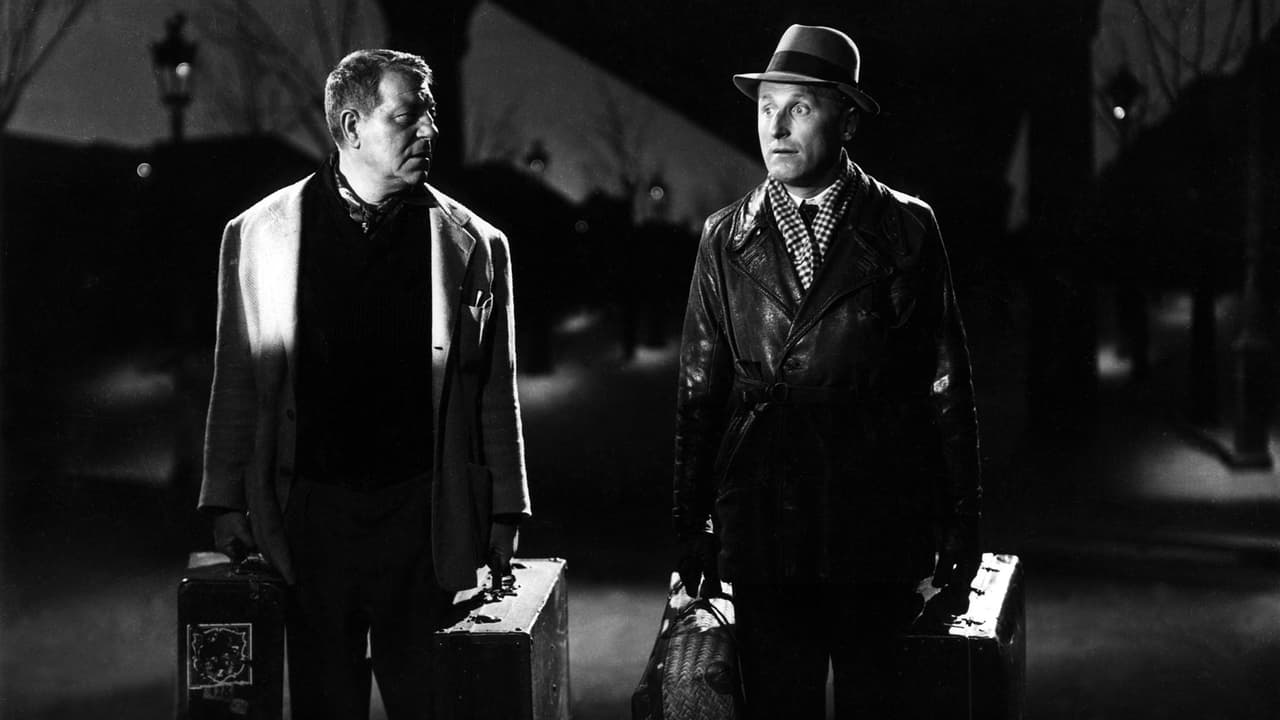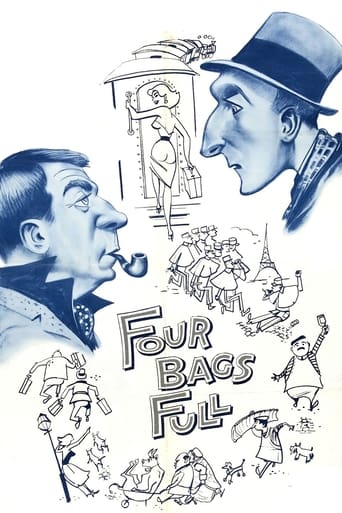

I think it is a mistake to categorize "La Traversée de Paris" as a comedy, for despite its light-hearted tone, the casting of two comedic giants, one already established: Bourvil and a newcomer soon to be the King of Comedy: Louis de Funès, despite an extraordinarily smile-inducing performance of a no less colossal actor : Monsieur Jean Gabin, there is more gravity, fatality and ubiquitous sensation of danger in Claude Autant Lara's masterpiece than any archetypal war drama. And never are the laughs triggered by funny situations but funny reactions from rather dramatic situations. We laugh first and think after."La Traversée de Paris" was released in 1956, a decade after World War II. Paris hadn't changed much and people still had vivid memories of these dark years that followed the defeat in 1940. When France ceased to belong to French, the country was economically a slave for Germany while morally, French people were entrapped in a never-ending torment: the bitterness of having lost war, freedom, and the faith on a brighter future. It was indeed, as they say now, the 'darkest hours of French history', and it's only fitting that the movie takes place during the night, to accentuate the black-and-white hypnotic photography. Darkness is omnipresent when memories from WWII are revived, from "Night and Fog" to "Army of Shadows".In fact, darkness is almost a protagonist for during the Occupation, it helped many good people to hide from the Germans or French Police. It was a time where French used their resourcefulness when ration tickets weren't enough. The darkest hours saw the rise of the black market. After all, when the dignity of a whole country was traded for peace, when the government has betrayed the honor of France, many French didn't feel like owing anything to the power, it's less heroism than pragmatism, yet from our perspective these men and women were brave because they jeopardized their lives and could easily say one word too many to a friend of the Germans, a collaborator, as they say.And the opening sets the tone, Marcel (Bourvil) and Mariette (Jeannette Batti) enter a bar, they learn that a black market partner was arrested because he trusted someone and told him he sold soap, he was then arrested. Speaking of soap, a painter named Grangil (Gabin) comes to the bar and needs to wash his hands, the bartender tells him that there's no soap as if there was enough trouble with it already. Police officers come and ask a client if his hands are dirty, coal has been stolen, Martin's girlfriend understands and discreetly gives Grangil a bar of soap. Everything is put together in that introducing sequence: solidarity, suspicion and betrayal. And if Grangil is brave enough to smuggle coal, maybe he'll make a good replacement to Martin's partner.Grangil accepts to cross the town with luggage full of pork parts, avoiding Police and Commandantur. The journey starts and there's something so exhilarating in Gabin and Bourvil's performance that we enjoy first the film for what it is, a superb demonstration of what the Golden Age of French cinema was. Gabin who gained a little weight and gray hair was still looking fairly young and he who used to be so restrained and cold is more grandiloquent than Bourvil who's generally the funny guy but here plays the straight man. It's as if Gabin enjoys post-war life again and can finally inject the relief of the peace in his performance and even vent his passion against the cowards in two marvelous scene.The first one is when he raises the prices of the mission, asking for more and more even though Jambier the butcher says yes from the beginning. Out of his lungs, he screams the name of Jambier, of the street he lives in, and asks for money where a disoriented Bourvil wants to shut him out. The scene is perhaps the noisiest of French cinema. Gabin is noisier than De Funès and funnier than Bourvil but the two stars take the distance with him, at that point, it's Cinema, all the genius of French Cinema finally imploding for laughs and simple laughs. But then right after comes the other powerful moment, with Gabin's rant, and boy, was he great at ranting, toward an old bartender and his clients who wanted to get them out from the bar when they felt something suspicious with two men carrying big luggage.They were coward enough to denounce them and not to even take a chance and the luggage with an infuriating Gabin delivered one of the most powerful monologues of French cinema incriminating all the little guys who think they're better than the others but don't even make an effort to be decent, he insult their ugliness , physical and moral and conclude his diatribe with an immortal "salauds de pauvres", literally " which would e translated as "you rotten poor". Marcel Aym's script has never sounded so incisive, so politically correct yet so humanly correct at these time were courage was a luxury. This is Gabin show, and he carries the film as confidently and strongly as he does for the luggage, Bourvil and De Funès will have their stars shining in many films to come, but the reason to watch the film is to admire Gabin.What he stands for in terms of masculinity and principals and moral values. Now, you have a French President claiming "I don't like the rich", which sounds so fake, so popularity-seeking,, so forgettable when a fictional Gabin treated the poor as rotten, it sounds real and eternal. This is how low things has sunk. "La Traversée de Paris" is a reminder that sometimes, it's the darkest hours that allow the brightest souls to shine.
... View MoreUser reviewer jameswtravers ("Bourvil and Gabin at their funniest", jameswtravers from London, England, 18 June 2000) offers background about the negative critical reaction. Bob Taylor ("Hugely entertaining", Bob Taylor from Canada, 13 June 2005) informs us the plot does not resemble the original story.Set in Occupied France during the second World War, Bourvil (Martin) recruits fellow black-marketeer Gabin (Grandgil) to transport a recently butchered pig to a predetermined destination in Paris by carrying two pairs of large suitcases. Much of the killing of the pig is seen on camera. Although the scene is filmed brilliantly, I always downgrade movies that have to resort to showing live animals being slaughtered.When we think of Gabin's monumental filmography, and know in this film we have French Resistance, Black Marketeers, French police and German soldiers/Gestapo men we naturally expect a very gritty journey. (Gabin reminds many people of Spencer Tracy. However, unlike Tracy, Gabin was always very convincing in dangerous, underworld roles. )However, "La traversee de Paris" is not entirely suspenseful. It also has comedic elements and it is allegorical. Gabin's Grandgil is rousing and larger than life, while Brouvil's Martin is duller and timid. Yet, Grandgil is an anti-hero. He unnecessarily creates tensions, particularly with lower class strangers. As compared with Martin's propensity to restore peace (with his wife), and especially with the very likable German interrogator, Grandgil is, well, the only pig in the vicinity.We also find out that this pig Grandgil also has a get-out-of-jail-for-free card. If we begin to associate Grandvil with the French who cooperated with the occupation, his overly rambunctious and demonstrative character seems less mystifying. "La traversee de Paris" upends the universe of post-war French film-goers used to watching films where cooperators are pariahs. This is likely why many film critics were opposed to it on release.The direction and the pacing hold up today. Gabin turns in another great performance of his top-shelf career. It is "off message," but another worthwhile nugget in Gabin's exceptional career.
... View MoreParis during the German occupation was a city with limited supply of basic needs. As the story begins we are taken to a butcher shop where people are seen waiting to buy whatever is available. Alas, when the last scrap of meat is sold, the crowd outside must go home empty handed. Passing the store, Marcel and Mariette Martin, witness the frustration, although they are on the way to be part of an illegal business that will mean some meat for their meager diet plus some money.The Martins come to Jambier's basement where a large pig is going to be slaughtered. Marcel's job is to take the meat across Paris to a butcher that is going to pay handsomely for the rare commodity. Since the hog that was killed weighed more than a hundred pounds, it is almost impossible for Marcel to transfer the valuable cargo to its destination. Outside Jambier's he finds a man that looks strong enough to help him. This man is Grandgil, a painter, who happens to be in the neighborhood.Grandgil, realizing there is a lot of money involved in the deal, shames Jambier into giving him more money, while Marcel is to get the original share. The two men embark on a night adventure through a dark Paris. The two allies find all kinds of diversions while attempting to deliver the meat. Dogs are attracted by the scent within the suitcases as well as other individuals. Their adventure ends badly when Marcel and Grandgil are found by a German patrol and taken to their headquarters.Claude Autant-Lara, the wonderful French director took a look at those dark days of the German occupation of Paris and turned it into a winning comedy that plays much better than it should because of the strength of the two main characters who come together because the promise of a lucrative deal, but who end up becoming friends. The war is omnipresent throughout the film, but it stays out of the way until the incident that marks the end of adventure of the two Parisians at the center of the story.The pairing of two French idols, Jean Gabin and Bourvil, pays in unexpected ways. Both actors show why they were the professionals they were in the French cinema. Their collaboration came natural. Mr. Autant- Lara gets good performances from his strong cast that included Louis De Funes, in a small role, Jeannette Batti, Georgette Anys, and Jacques Martin, among them.A must see for fans of the great Claude Autant-Lara
... View MoreMarcel Aymé was an excellent writer who left us, among other things, short stories set in occupied Paris. No patriotic pathos or teary laments, but a dark humorous look at everyday life. With this movie Bourvil revived his carreer and established himself as a real great comedian. Jean Gabin, as usual, is excellent. The story line is simple : two men have to carry across Paris black market pig meat. Bourvil, an unemployed cab driver does it for money, Gabin, a well known artist does it for kicks.
... View More